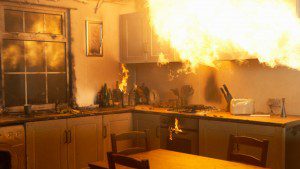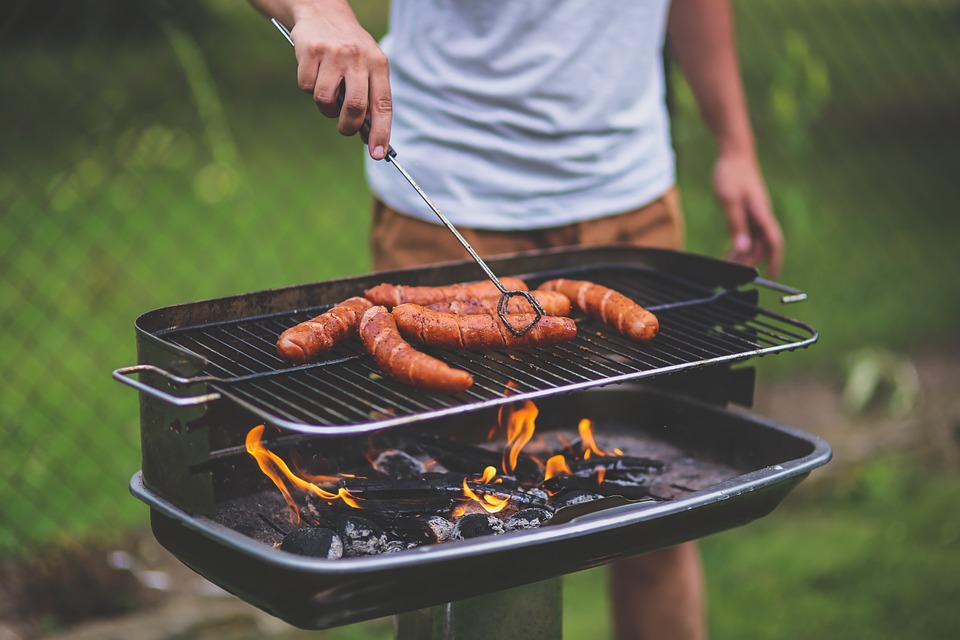How to Clean Up and Prevent Grease Fires
According to the National Fire Protection Association, cooking is the most common cause of kitchen fires, and the greatest risk comes from frying. Grease fires are dangerous because they can get out of control easily and 54% of reported non-fatal injuries came from victims trying to put out the flames themselves. PreventionPrevention refers to actions taken to reduce the likelihood ... More is key when it comes to grease fire safety.
These tips will can help to prevent fires in the kitchen
- Cook in a clean area with clean cookware. A greasy stove top or exhaust hood can catch fire easily once a burner gets hot.
- Clean up spills as soon as the cooktop cools. Drip pans that have grease or food can ignite the next time they’re used.

Grease fires burn very quickly.
- Never leave cooking food unattended. It only takes minutes for pans to boil over or scorch. If oil begins to smoke, turn the heat off and carefully remove the pan from the burner. This is a sign that it’s getting too hot and is close to catching on fire. Don’t rush to move the pan; the grease may not be on fire but it is still hot enough to cause serious burns if spilled on clothes or skin.
- Keep a lid within easy reach to smother flames, if necessary.
- If you need to drain grease from a pan, make sure none of it has spilled down the side of the pan before returning it to the burner.
- Keep a fire extinguisher on hand. It is actually recommended to have at least 3 in the home that are easily accessible, preferably in the garage, living room, and kitchen.
- Keep all combustible items away from the stove top and oven. If a grease fireA grease fire is a fire that occurs when cooking oils or fat... More touches any of these materials, it can quickly spread throughout the entire kitchen. These include all of the following:
- Cookbooks
- Towels
- Paper towel
- Wooden and plastic utensils
- Wooden cutting boards
- Other food items
- Smother the pan if it does catch fire. Quickly grab an oven mitt and place the lid over the pan. Never pick it up to run it under the sink or bring it outside.
If you do have a grease fire, keep calm and take these steps:
- Turn off the heat.
- Use a lid to smother the flames. A towel will only fuel the flames, literally, and water sinks to the bottom of the pan, heats up and turns into a vaporVapor is the gaseous form of a substance that is typically l... More that will cause a flaming oil explosion.
- Use baking soda to extinguish the fire. Never, ever substitute baking powder, flour, sugar, or any other kitchen products.
- Use a fire extinguisher, if you have one. The product will leave a messy residueResidue is any leftover material, such as soot, dust, or che... More, but it’s better than the alternative.
- If the fire gets out of control, get everyone out and call 911 from a neighbor’s home.
Just be careful as many smoke and sootSoot is fine black particles composed of carbon and other ma... More byproducts can trigger health issues during the cleaning process. But as long as the damage hasn’t spread too far, here are some steps you can take to get started on the smoke cleanup process.
Cleaning Up After a Fire in the Kitchen
- Clean the entire house. Although the kitchen may have been the only room that was affected, smoke and sootSoot is fine black particles composed of carbon and other ma... More can travel through the air ducts to affect all other building materials. Make sure to change the air filter and scrub down the walls with dry sponges, using vertical motions to remove the sootSoot is fine black particles composed of carbon and other ma... More.
- Wipe down the kitchen cabinets. Try to wipe off the sootSoot is fine black particles composed of carbon and other ma... More with a dry spongeA sponge is a porous material used to absorb liquids or clea... More. You may have to sand, reseal, and paint the surfaces to fully remove the smoke odorAn odor is a smell, often detectable by the human nose, whic... More. Keep in mind that the sootSoot is fine black particles composed of carbon and other ma... More and smoke may have reached the back, so they may have to be treated as well.
- Discard all food items. Because soot and smoke damage is able to spread to contaminate all food products, be sure to dispose of all open food products to protect your health.
- Clean the refrigerator. You will probably have to replace the seal on the door. But as long as the refrigerator still works, just be sure to clean the filters, back of the fridge, and fans. Make sure that all byproducts are removed to avoid contaminating new food products.
- Replace the microwave above the stove. While some microwaves can be salvaged, doing so will require more work than they are worth. It will be easier to buy a replacement instead of spending days and even weeks to get rid of the smoke odorAn odor is a smell, often detectable by the human nose, whic... More.
Professional Help with Smoke Damage Cleanup from Grease Fires
While it is possible, cleaning up after a fire can be difficult as sootSoot is fine black particles composed of carbon and other ma... More byproducts can easily become smeared onto building materials. Smoke odors can also cause permanent damage, embedding itself within porousPorous describes a material that contains small openings or ... More materials; they will need professional odor-removing products to be removed thoroughly.
RestorationRestoration is the process of returning a property to its pr... More professionals offer fire and smoke damage restoration for your property and possessions to fully return them to their original condition. We’ll respond quickly to prevent the spread of sootSoot is fine black particles composed of carbon and other ma... More and smoke through the rest of the building.












